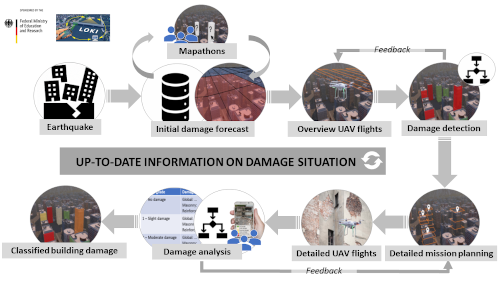Join us and many European researchers from the Earth, planetary and space sciences in the virtual European Geosciences Union (EGU) assembly from 19 to 30 April 2021!
Are you interested in innovative methods and concepts applied to natural hazards? Then join our 2-minute talks on research within the LOKI project on Monday, 26 April, and Thursday, 29 April. It is not too late to register to listen to the talks and take part in the discussion (undergraduate and master students can register for free)!
On Monday, Julia Kohns (KIT) will be presenting the interdisciplinary concept of LOKI and its innovative methods for earthquake damage detection and classification using airborne observation of critical infrastructures. The integration of various disciplines and the combination of different concepts and technologies allows supporting disaster relief in different temporal and spatial resolutions with timely and reliable information on earthquake-induced damage to critical infrastructures. Technologies and methods combined in LOKI include global dynamic exposure modelling, automatic mission planning for UAV-based data acquisition, assessment of detailed building damage using Machine Learning and crowdsourcing based on high-resolution 3D point cloud and 2D image data and consideration of building-specific design and structure in damage assessment.

On Thursday, a second talk by Vivien Zahs will be focusing on 3D point cloud-based assessment of detailed building damage through a combination of machine learning, crowdsourcing and earthquake engineering. The novelty of our approach consists in the combination of strengths of machine learning approaches for point cloud-based damage classification and visual interpretation by human contributors through Micro-Mapping tasks. The optimal combination of operation and weighted fusion of both methods is thereby dependent on event-specific conditions (e.g. data availability and quality, temporal constraints, spatial scale, extent of damage). Additionally, we make use of expertise in earthquake engineering: By considering region-specific building design and structure to identify typical damage patterns and observations of previous earthquakes, the approach is designed to be applicable to damage assessment in different geographic regions.
Find the abstracts already here:
Kohns, J., Zahs, V., Ullah, T., Schorlemmer, D., Nievas, C., Glock, K., Meyer, F., Mey, H., Stempniewski, L., Herfort, B., Zipf, A., and Höfle, B. (2021): Innovative methods for earthquake damage detection and classification using airborne observation of critical infrastructures (project LOKI). EGU General Assembly 2021, online, 19–30 Apr 2021, EGU21-2712, https://doi.org/10.5194/egusphere-egu21-2712.
Zahs, V., Herfort, B., Kohns, J., Ullah, T., Anders, K., Stempniewski, L., Zipf, A., and Höfle, B. (2021): 3D point cloud-based assessment of detailed building damage through a combination of machine learning, crowdsourcing and earthquake engineering. EGU General Assembly 2021, online, 19–30 Apr 2021, EGU21-1304, https://doi.org/10.5194/egusphere-egu21-1304.
LOKI is a joint research project where project partners develop different components of the LOKI system and bring in their expertise in the following fields:
- Aeromey GmbH: UAV infrastructure and hardware
- FZI Research Center for Information Technology: Mission planning
- German Research Center for Geoscience (GFZ): Exposure modelling
- Karlsruhe Institute for Technology (KIT): Typification of earthquake damage and non-linear analysis of building classes
- GIScience Research Group, Heidelberg University: Crowdsourcing
- 3DGeo Research Group, Heidelberg University: Automatic damage classification & combination with crowdsourcing
Stay tuned for updates on the project website, the GIScience News Blog, on Twitter or follow LOKI or ResearchGate.
LOKI is running from 2020-2022 and is funded by BMBF (funding code: 03G0890)



